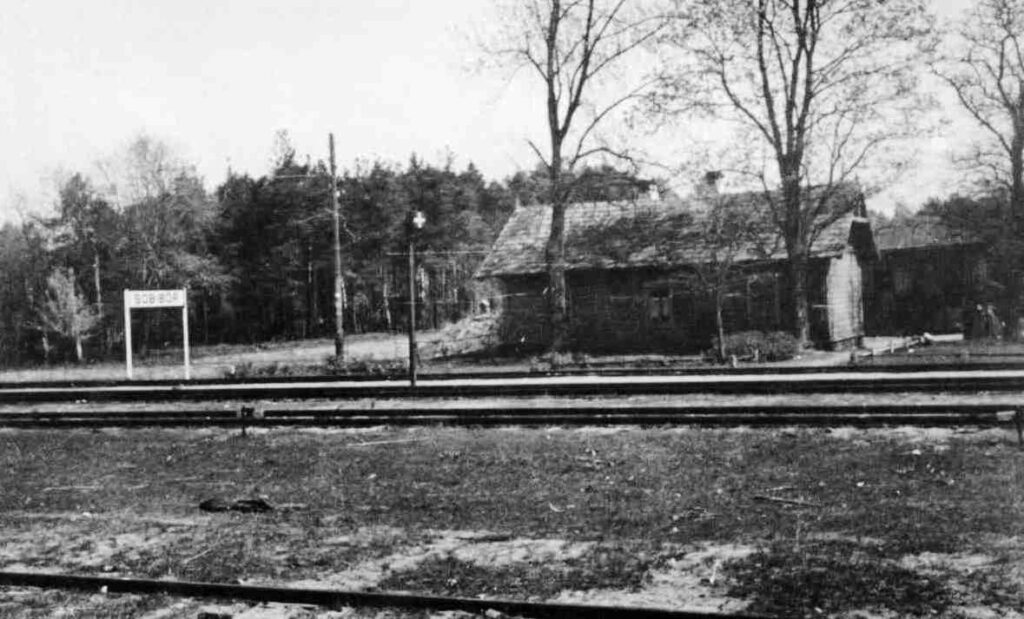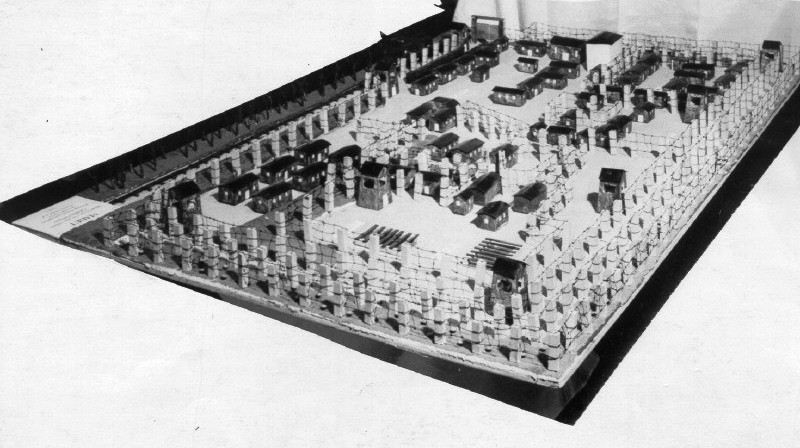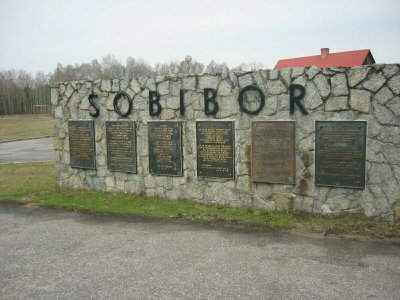From the Memoirs of a Sobibor Survivor
By: Yaakov Rosenfeld, Ganzach Kiddush Hashem
A short time ago, as part of Ganzach Kiddush Hashem’s preparations for educational initiatives marking eighty years since the closing of the Sobibor camp, I was in the archives of Ganzach Kiddush Hashem in Bnei Brak looking through books, journals, and testimonies.
I read with bated breath Dov Freiberg’s testimony “Survivor of Sobibor”, and noted to myself several points from his memoirs that I intended to publish in this context.
This is the first story. As you read, you will likely become lost in thought.

The train station in the Sobibor extermination camp
A Horrifying Visit
One day, at the beginning of the war, a few days after he got up from sitting shiva (week long mourning period) for his young father, an unknown woman knocked on the door of his house in occupied Lodz. His mother approached, looked at the guest’s face, and turned pale.
The two stood in front of each other in silence, and Dov, the boy who recently had to grow up and maybe even grow old, was horrified. He understood that there was some terrible secret in this situation, but he did not dare to ask.
Finally, the mother whispered: “You can enter,” and she entered.
The stranger asked: “Do you know who I am?”
And his mother answered: “Yes, I know”… and again there was silence.
The two women talked to each other.
Dov listened and suddenly understood.
He had a relative, on his father’s side, who had passed away a few years prior. Her parents were already far from Judaism, but they never imagined that this was what their daughter would do. Her brother, a Jewish disbeliever, was a friend of his father’s, and they would have heated arguments until they were hostile to each other. Dov remembered the distant days when the man would visit their home in Lodz and argue with his father about matters “on which the soul depends.” He apparently did not believe in anything and his actions were corrupt, but when the daughter decided to marry a gentile and convert to Christianity, her decision shocked the family and brought disgrace upon her. Her parents were then enveloped in piercing grief and terrible shame, and after the shock of it, it was as if they erased this daughter from their consciousness. They even cursed her. However, the black stain that this woman left on the whole family was never erased.
The whole family knew, even if they didn’t talk about it explicitly, that there was a branch, a “root that produces hemlock and wormwood” (Deuteronomy 29:17), that broke off from the tree, and they didn’t talk about it.
The apostate woman, Dov knew, won a senior position in the Lodz municipality, and so to speak forgot her people and her father’s house. She lived a normal life with her gentile husband and started a Christian family, a disgrace.
This was the woman who was now standing at his house and asked to speak with his mother.
After addressing the disaster that happened to them, the woman said: “I came to you because I felt that I had to talk to someone from the family. My heart told me that you would listen to me. Don’t lock the door for me.”
Dov saw the broken woman, the dead eyes, and he remembered the arguments his father had with the woman’s brother.
The brother would claim that “your” charedi (ultra-Orthodox) appearance, the beard, the wigs, and all mannerisms, are what cause antisemitism and hatred from the gentiles. His father would argue against him, among other things, to please look at the Jews of Germany, the enlightened, the assimilated; they themselves forgot what a Jew looks like… Did it help them?
The arguments never ended, they continued in harsh tones time after time, until that disastrous affair. When this woman, the one he was now seeing for the first time in life size, not in imagination, did what she did.
Dov remembered that when his father returned from the funeral of his relative, the mother of the apostate, who could not bear the grief and passed away a year before the war, he angrily told about the audacity of the apostate daughter who dared to come to the funeral of the one whom “she herself killed!”
His mother then replied, “And you think it was easy for her to come and feel the hateful looks that were fixed on her? She stood on the side mourning and crying and no one bothered to approach her!”

Model of the Sobibor extermination camo (built by Alexander Pechersky, commander of the revolt in the camp)
“Disgrace Incarnate”
Now the woman sat, disgrace incarnate, in their little house. His mother ordered the children to leave, and Dov clung to the door and listened behind it to the woman’s words.
Helpless, she sat and revealed to his mother what had happened to her recently. She said that her marriage did not go well, and that the members of her husband’s family hated her and displayed clear antisemitism towards her, despite her conversion to Christianity. The things that were initially, somehow, tolerable, had become an ongoing nightmare. She experienced fights and insults, until she was forced to divorce her gentile husband, and was quickly fired from her job in the municipality.
Now she was sharing a common fate with her Jewish brethren… In a broken voice she said: “In the eyes of the gentiles, I remained a Jew; in the eyes of the Jews, I am a gentile. I have no place in this world.”
It is not known what happened to that aunt, who on that day said goodbye to them with terrible sadness, and was not even able to taste anything at home there. She left, and never came back. Dov’s mother then regretted that she could not find any comforting words for the depressed woman. She feared for her, but as mentioned, she was never seen again.
Sobibor Survivor
Sobibor was an extermination camp in the Lublin district in which between 170,000 and 250,000 Jews were murdered. There were almost no survivors of this valley of killing.

Memorial at the Sobibor death camp site
Dov Freiberg, the survivor of Sobibor, was able to immigrate for Israel and rebuild his life. He was a frequent lecturer on the Holocaust and testified at the Eichmann trial. His words that received a lot of publicity were: “I managed to leave Sobibor, but Sobibor will never leave me.”
Eighty years ago, in the fall of 5704 (1943), Dov managed to escape from Sobibor and safely reach the forests. He is one of the only survivors of the revolt, and he often told the students about the ordeal that befell him and the loss of his family and community.
In memory of Dov ben (son of) Moshe and Rivka














